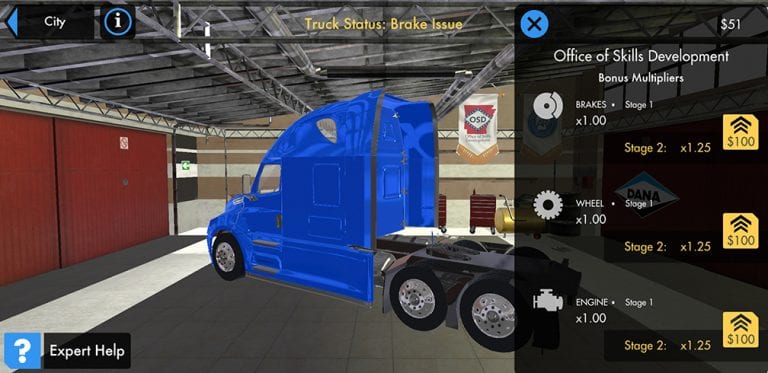A new augmented-reality video game is giving young people an early glimpse of the trucking maintenance and repair industry in the hopes that it develops into a career interest.
TMC SuperTech: The Game was developed as a joint project between the American Trucking Associations’ Technology & Maintenance Council (TMC) and Arkansas State University-Beebe, and is produced by Florida-based Design Interactive. The game is available free for both Apple and Android platforms.
“Today’s technician faces very different challenges than 30 years ago. They are more likely to use a computer than a crescent wrench to repair today’s commercial vehicles,” said Robert Braswell, executive director of TMC, in a press release.
“Gamification is a compelling new way to reach people, especially a younger audience, through smartphones and tablets. We are very excited to employ this new technology to reach students who may be otherwise unaware of the opportunities they have as a commercial vehicle technician,” Braswell continued.
Kenneth Calhoun, a 30-year-plus veteran of the trucking industry in Arkansas and past TMC chairman, spearheaded the effort to create the game. He was also instrumental in bringing the project to the attention of the Arkansas State University system, where he is an advisor for the medium/heavy trucking engine program in Searcy, Arkansas.
Calhoun said the labor shortages facing the trucking industry are part of a larger issue of reduced skilled labor across the board, something he has taken an active role to address through various boards and commissions in Arkansas.
“The skills gap, in no small part, comes about from the idea, for a few generations now, that the only path for success is a four-year college degree,” he said. “Nothing could be further from the truth. There is a career path (in truck repair) that is incredibly lucrative, very rewarding, that just goes under the radar. And like so many of the skill trades, if there’s no exposure, then how does a student know about them?
“To think about society now, where people like to walk around with their faces buried in their phone for whatever reason, including games, we thought okay, this a potential avenue where we can introduce a whole new audience to our industry and to some of the really cool things about our industry,” Calhoun said.
TMC SuperTech requires the player to manipulate a rig through a series of challenges, including maneuvering through a city and dealing with mechanical problems. Players learn to diagnose and repair tractor-trailers through a series of three mini-games focused on tire/wheel, brake and engine repair. Gamers can progress through 15 levels of game play, starting as a student technician and ultimately becoming the owner of their own repair shop.
Gamers are rewarded by being “paid” within the app; the “funds” can be used to purchase special paint jobs for their fleet of trucks and other performance improvements. The game targets middle schoolers, building in an element of competition and problem-solving that makes video games so popular in the first place.
“Opening up visibility to other possibilities, like the career path available for diesel technicians, is a primary purpose of the gamification effort that came about through TMC,” Calhoun said. “To be clear, this is not training; it is awareness. I grew up thinking big machines, and trucks in particular, were incredibly cool because I had had that exposure from my family. This is a new way to relate that message.”
The American Trucking Associations has launched a national publicity campaign to promote the game and has also formed a strategic affiliate partnership with the networking platform Tallo, sometimes called “LinkedIn for students.”
“Tallo has a very broad base, I understand, of several hundred thousand students that are enrolled in (the platform),” Calhoun said. “It focuses on career opportunities and making the connection between industry and education.”
Calhoun was ideally suited to lead the project, but not because of his gaming skills. In addition to his role in higher education and the private sector, he’s well connected with industry and economic development bodies in Arkansas. He used these connections to create partnerships that helped get the game built — and he wasn’t shy about leveraging a home-field advantage to promote Arkansas in the process. The game is set in Little Rock, for instance, and some of the gaming environments boast the state flag or other local identifiers.
“Because the Arkansas Office of Skills Development was willing to make a financial contribution to the development of the game, I negotiated that, being a premier sponsor, this is what Arkansas wanted in return,” he said. “I had a year where I was chairman of the TMC, and this was one of my primary focuses during my term. So, I got to have a little more leverage and a little more input on those negotiations.”
He shrugged. “Sometimes, it’s good to be the king.”
Arkansas also got the game a month ahead of the rest of the country, during which time it quickly penetrated the state’s public schools to increase awareness, serving as a model for other states to follow.
“It was pushed out through the Department of Commerce and Arkansas State University-Beebe,” he said. “The state Department of Education participated and pushed the message out through the schools that we were trying to reach at the middle school level. That way, teachers and administrative faculties had awareness to the game’s existence, as well.”
Officials are already considering how to improve and expand the game from the current map of three game scenarios. The effort currently partners with TA Petrol and Cummins Engines — with corresponding product and logo placement — and Calhoun sees additional partnership opportunities as the game expands.
“A little bit of this is experimentation and we feel that by being able to collect data on who downloads the game and how long they play it and whatever information we can collect on them. It might give us some insight on how this merits expansion,” he said.
“We intend to continue to bring on partners to bring on content that will be added to the game going forward,” Calhoun continued. “We want this to be a continuous thing, where it’s not something you play for a few days or a few weeks, get bored with and put away.”
Dwain Hebda is a freelance journalist, author, editor and storyteller in Little Rock, Arkansas. In addition to The Trucker, his work appears in more than 35 publications across multiple states each year. Hebda’s writing has been awarded by the Society of Professional Journalists and a Finalist in Best Of Arkansas rankings by AY Magazine. He is president of Ya!Mule Wordsmiths, which provides editorial services to publications and companies.











